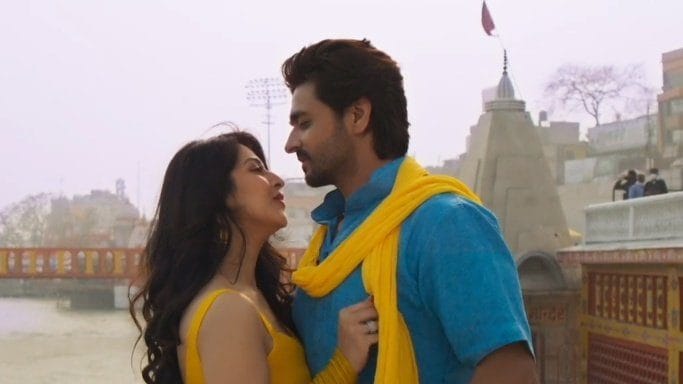Hindutva Chapter One: Main Hindu Hoon seeks to ride India’s current political climate, but doesn’t know how to do it — except have the hero chest thump being a ‘Hindu’ or show Islam as a religion of radicals every few minutes. This movie by Karan Razdan, who wrote films like Dilwale and Trimurti in the 1990s, appears to be a product of arguments and ‘ideas’ circulated on WhatsApp groups put together for the big screen.
The writing, direction, acting and other aspects of this movie seem to be playing to the gallery by tugging at every instinct and narrative popularised by the Hindutva ecosystem over the past few years. The movie seems acutely aware of which strings to pull to make it popular among its targeted audience. In that, it succeeds.
Earlier this year, The Kashmir Files and Hurdang had also tried to tackle politically fraught issues such as the 1990 exodus of Kashmiri Pandits and caste-based reservation in India.
While director Vivek Agnihotri’s The Kashmir Files divided viewers and critics alike, Nikhil Bhat’s Hurdang, which looked at the Mandal Commission and reservation through the eyes of a dominant caste man from Uttar Pradesh, was judged unconvincing. Now, Hindutva joins the list of movies that want to take a shot at currently popular topics but don’t do any real justice to them.
Also read: The Kashmir Files tries showing 1990 exodus ‘truth’ but Vivek Agnihotri gives it death blow
Toxicity abound
Bharat Shastri, a Brahmin (played by Aashiesh Sharma) and Sameer Siddiqui, a Muslim (played by Ankit Raj) are pitted against each other in a university students union election. Set in Uttarakhand, the two have been childhood friends and their families, too, share a good relationship. Sameer is swayed by the intense hatred fed to him by corrupt maulanas and even sent to Kashmir to create tension among the youth there.
Sameer’s girlfriend Sapna Gupta (Sonarika Bhadoria) is Hindu who feels minorities in India are subjected to a lot of mistreatment. Bharat is a saffron-loving, conch-playing religious man who doesn’t believe in the cause that Sameer and Sapna are fighting for. He accuses Sameer and his group of being toxic in the name of being secular, and a video of it goes viral. That prompts a Hindu group leader Krishnakant Bhalerao (Govind Namdev), who is convinced that ‘Hindutva khatre mein hai (Hindutva is in danger)’ to ask Bharat to stand in the students union election against Sameer.
Bharat is encouraged by his father Pandit Ji (Anup Jalota) who is given dialogues like, “Agar hum is desh se nikale gaye, toh kya koi doosra Hindu desh hai jahan hum jake reh sakenge? (If we are thrown out of India, is there another Hindu nation where we can go and live?)”.
There is also Guru Maa, played by Deepika Chikhalia, who ‘guides’ Bharat to see how his fight with Sameer is akin to Mahabharat. Bharat’s holier-than-thou attitude and literal as well as metaphorical chest-thumping seems designed to repeatedly assert the film’s tagline, ‘Main Hindu Hoon’.
Also read: Hurdang creates the world of Mandal student politics but not a convincing one
Propaganda over acting
Hindutva takes cue from all the popular anti-Muslim views, whether it’s the so-called ‘love jihad’ or the narrative that Muslims are inherently terrorists or that India is a Hindu Rashtra. In fact, the movie is obsessed with portraying Islam negatively, having some or the other character repeatedly calling the religion out as radical every few minutes, amid saffron flags and a song by Daler Mehendi glorifying the Hindutva ideology. There is also a token Sikh character in the film who supports Bharat unconditionally.
In terms of acting, veteran Govind Namdev does his bit, while Anup Jalota doesn’t seem cut out for acting. The lead Bharat is so dead-pan even Hindutva supporters might have a hard time taking it seriously, unless of course it doesn’t matter. Sameer is only a caricature, while Sonalika is a prop for the ‘love jihad’ angle.
After a while, writer-director Karan Razdan’s focus on making his characters spout anti-Muslim slogans starts to give away the intention behind making the film. In the process, the film throws away any opportunity to sincerely handle a popular topic shaping India’s current politics and fails to offer any insight or nuance to its viewers.
(Edited by Prashant)






